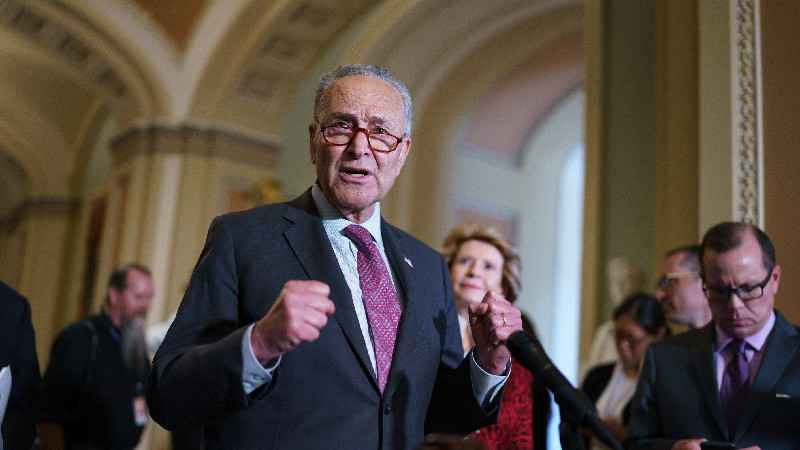Senate Democrats announce $3.5 trillion budget agreement

Senate Majority Leader Chuck Schumer, D-N.Y., speaks to reporters before meeting with Democratic members of the Texas Legislature who are trying to kill a Republican bill in Austin that would make it harder to vote in the Lone Star State, at the Capitol in Washington, Tuesday, July 13, 2021.[AP Photo/J. Scott Applewhite]
Senate Democrats announced Tuesday that they have reached a budget agreement among themselves that envisions spending an enormous $3.5 trillion over the coming decade. The fiscal plan would pave the way for Democrats’ drive to direct a huge pool of federal resources at climate change, health care and family-service programs sought by President Joe Biden.
Senate Majority Leader Chuck Schumer, D-N.Y., announced the accord flanked by all 11 Democrats on the chamber’s budget committee after a two-hour evening meeting that capped weeks of bargaining among party leaders, progressives and moderates.
The agreement is a major step in Democrats’ drive to turn Biden’s effort to bolster an economy that was ravaged by the pandemic and set it on a course for long-term growth. Separately, bipartisan senators have been working toward another measure that would spend around $1 trillion on roads, water systems and other infrastructure projects.
If congressional Democrats rally behind the budget agreement announced Tuesday and push it through Congress in the coming weeks, it would help them enact a subsequent, sweeping bill that would actually fund their priorities.
That’s because the budget resolution contains language that would let Democrats move the follow-up, huge spending bill through the Senate with just a simple majority, not the 60 votes Republicans could demand by using a bill-killing filibuster.
“We are very proud of this plan,” Schumer told reporters. “We know we have a long road to go. We’re going to get this done for the sake of making average Americans lives a whole lot better.”
Schumer said Biden would attend a lunch at the Capitol Wednesday of all Senate Democrats “to lead us on to getting this wonderful plan” enacted. But Schumer and other lawmakers did not respond when asked if they had the support of all 50 senators they will need to push the measure through the evenly divided Senate.
Schumer said the proposal would call for financing Biden’s budget priorities “in a robust way.” He also said it would include a priority of Senate Budget Committee Chairman Bernie Sanders, I-Vt., and other progressives: an expansion of Medicare, the federal health insurance program for older people, to cover dental, vision and hearing services.
Sanders called the agreement “a pivotal moment in American history” that would end an era in which, he said, rich people and big companies weren’t bearing enough of the burden of financing government programs.
“Those days are gone,” said Sanders. “The wealthy and large corporations are going to start paying their fair share of taxes, so that we can protect the working families of this country.”
Sen. Mark Warner, D-Va., a leading moderate who helped shape the budget package, said the measure would be fully paid for with offsetting revenue but provided no detail.
The budget will include language stating that there will be no tax increases on people making less than $400,000 a year or on small businesses, according to a Democratic aide familiar with the negotiations granted anonymity to discuss them.
The budget resolution sets only broad spending and revenue parameters, leaving specific decisions about which programs are affected — and by how much — for later.